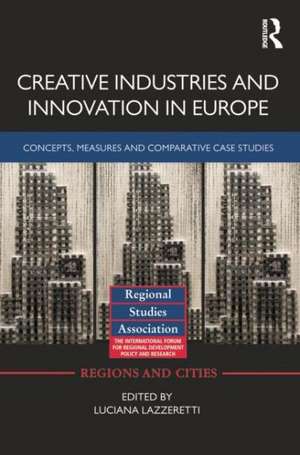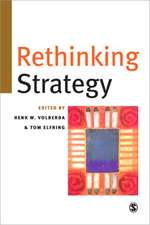Creative Industries and Innovation in Europe: Concepts, Measures and Comparative Case Studies: Regions and Cities
Editat de Luciana Lazzerettien Limba Engleză Paperback – 17 iul 2014
This book brings together a set of multidisciplinary contributions to investigate the kaleidoscope of European creativity, focussing on CCIs and the innovations connected with them. The two main questions that this volume aims to address are: How can we identify, map and define CCIs in Europe? And how do they contribute to innovation and sustainable growth?
The volume is split into two parts. The first part deals with the definition, measurement and mapping of the geography of European CCIs according to a local economic approach, focussing on Italy, Spain, the UK, Austria, Denmark and France. This section surveys the different industrial typologies and spatial patterns, which underline a significant dissimilarity between the North and the South of Europe, mainly due to the difference between heritage-driven and technology-driven countries. The section concludes with a case study on a Japanese creative city.
The second part collects some interesting cases of innovation generated in creative spaces such as cities of art or creative clusters and networks. This entails the study of innovations among creative and non-creative sectors (e.g. laser technologies in conservation of works of art and design networks in Italy) and across European and non-European countries (e.g. Spaghetti Western movies in the US or visual artists in New Zealand). Finally, an innovation capacity of culture that can regenerate mature sectors (e.g. the French food supply chain and Swiss watch Valley) or combine the creative and green economics paradigms (e.g. the green creative cities in North Europe) is analyzed.
This book will appeal to academics, scholars and practitioners of urban and regional studies, cultural and creative economics and managerial and organization studies.
| Toate formatele și edițiile | Preț | Express |
|---|---|---|
| Paperback (1) | 423.58 lei 43-57 zile | |
| Taylor & Francis – 17 iul 2014 | 423.58 lei 43-57 zile | |
| Hardback (1) | 956.83 lei 43-57 zile | |
| Taylor & Francis – 18 iul 2012 | 956.83 lei 43-57 zile |
Din seria Regions and Cities
- 8%
 Preț: 389.90 lei
Preț: 389.90 lei -
 Preț: 310.65 lei
Preț: 310.65 lei -
 Preț: 313.19 lei
Preț: 313.19 lei -
 Preț: 327.83 lei
Preț: 327.83 lei -
 Preț: 326.34 lei
Preț: 326.34 lei -
 Preț: 352.80 lei
Preț: 352.80 lei - 18%
 Preț: 1064.04 lei
Preț: 1064.04 lei - 18%
 Preț: 1293.66 lei
Preț: 1293.66 lei - 18%
 Preț: 1059.14 lei
Preț: 1059.14 lei -
 Preț: 486.42 lei
Preț: 486.42 lei - 15%
 Preț: 701.32 lei
Preț: 701.32 lei - 18%
 Preț: 1119.45 lei
Preț: 1119.45 lei -
 Preț: 421.61 lei
Preț: 421.61 lei - 26%
 Preț: 765.59 lei
Preț: 765.59 lei -
 Preț: 423.57 lei
Preț: 423.57 lei -
 Preț: 285.09 lei
Preț: 285.09 lei - 18%
 Preț: 1173.97 lei
Preț: 1173.97 lei - 26%
 Preț: 763.61 lei
Preț: 763.61 lei - 18%
 Preț: 1166.05 lei
Preț: 1166.05 lei - 15%
 Preț: 461.87 lei
Preț: 461.87 lei - 18%
 Preț: 1335.56 lei
Preț: 1335.56 lei - 18%
 Preț: 1001.90 lei
Preț: 1001.90 lei - 18%
 Preț: 1059.48 lei
Preț: 1059.48 lei - 26%
 Preț: 192.18 lei
Preț: 192.18 lei - 18%
 Preț: 956.83 lei
Preț: 956.83 lei - 15%
 Preț: 428.79 lei
Preț: 428.79 lei - 15%
 Preț: 713.20 lei
Preț: 713.20 lei - 15%
 Preț: 500.55 lei
Preț: 500.55 lei - 18%
 Preț: 1061.54 lei
Preț: 1061.54 lei - 18%
 Preț: 1059.18 lei
Preț: 1059.18 lei - 15%
 Preț: 508.75 lei
Preț: 508.75 lei - 18%
 Preț: 1061.06 lei
Preț: 1061.06 lei - 18%
 Preț: 1168.85 lei
Preț: 1168.85 lei - 18%
 Preț: 1065.06 lei
Preț: 1065.06 lei - 18%
 Preț: 1065.06 lei
Preț: 1065.06 lei - 18%
 Preț: 1064.70 lei
Preț: 1064.70 lei - 18%
 Preț: 709.70 lei
Preț: 709.70 lei -
 Preț: 488.71 lei
Preț: 488.71 lei - 18%
 Preț: 1056.14 lei
Preț: 1056.14 lei - 18%
 Preț: 1168.09 lei
Preț: 1168.09 lei -
 Preț: 239.02 lei
Preț: 239.02 lei - 18%
 Preț: 1058.38 lei
Preț: 1058.38 lei - 18%
 Preț: 1061.57 lei
Preț: 1061.57 lei
Preț: 423.58 lei
Nou
Puncte Express: 635
Preț estimativ în valută:
81.05€ • 84.85$ • 67.07£
81.05€ • 84.85$ • 67.07£
Carte tipărită la comandă
Livrare economică 07-21 aprilie
Preluare comenzi: 021 569.72.76
Specificații
ISBN-13: 9781138792197
ISBN-10: 1138792195
Pagini: 328
Ilustrații: 46 black & white illustrations, 34 black & white tables, 3 black & white halftones, 43 black & white line drawings
Dimensiuni: 156 x 234 x 20 mm
Greutate: 0.48 kg
Ediția:1
Editura: Taylor & Francis
Colecția Routledge
Seria Regions and Cities
Locul publicării:Oxford, United Kingdom
ISBN-10: 1138792195
Pagini: 328
Ilustrații: 46 black & white illustrations, 34 black & white tables, 3 black & white halftones, 43 black & white line drawings
Dimensiuni: 156 x 234 x 20 mm
Greutate: 0.48 kg
Ediția:1
Editura: Taylor & Francis
Colecția Routledge
Seria Regions and Cities
Locul publicării:Oxford, United Kingdom
Public țintă
PostgraduateCuprins
Cultural and Creative Industries: An introduction Luciana Lazzeretti Part I Cultural and Creative Industries in Europe 1. The Geography of Creative Industries in Europe: Comparing France, Great Britain, Italy and Spain Rafael Boix, Luciana Lazzeretti, Francesco Capone, Lisa de Propris and Daniel Sánchez 2. Why Do Creative Industries Cluster? Luciana Lazzeretti, Rafael Boix and Francesco Capone 3. Creative Industries in Spain: The case of printing and publishing Rafael Boix 4. Creative and Cultural Industries in Austria Michaela Trippl, Franz Tödtling and René Schuldner 5. Creative Industries in the UK Lisa De Propris 6. Leisure, Culture and Experience Economy as Creative Strategy in the Periphery: Does North Denmark benefit from the experience economy? Anne Lorentzen 7. Creative Industries and Creative City Policy in Japan Masayuki Sasaki Part II Innovation, Creative Space and Symbolic Value 8. Complexity Geography and the Rise of the Green Creative City Philip Cooke 9. From Cultural Cluster to Creative Cluster: The case of art restoration in Florence Luciana Lazzeretti and Tommaso Cinti 10. Geographical Proximity and New Short Supply Food Chains Leïla Kebir and André Torre 11. Product Category Dynamics in Cultural Industries: Spaghetti Westerns’ influence on American Western movie genre Gino Cattani and C. Moritz B. Fliescher 12. Cultural Activities in Territorial Development: The case of cultural and creative enterprises in the Swiss watchmaking industry Hugues Jeannerat and Olivier Crevoisier 13. Putting Creativity in Place: A relational and practice perspective Udo Staber 14. Design at Work: The interwoven effect of territorial embeddedness, social ties and business networks Marco Bettiol and Silvia Rita Sedita 15. The Importance of Gatekeeping Processes and Reputation Building in the Sustainability of Creative Milieux: Evidence from case studies in Lisbon, Barcelona and São Paulo Pedro Costa
Notă biografică
Luciana Lazzeretti is Professor of Business Economics and Director of the Postgraduate Programme in Economics and Management of Cultural Goods and Museums at the Faculty of Economics, University of Florence, Italy.
Descriere
This book brings together a set of multidisciplinary contributions to investigate the kaleidoscope of European creativity, focussing on cultural and creative industries (CCIs) and the innovations connected with them. The two main questions that this volume aims to address are: How can we identify, map and define CCIs in Europe? And how do they contribute to innovation and sustainable growth?













